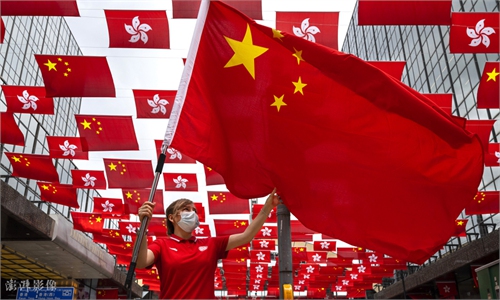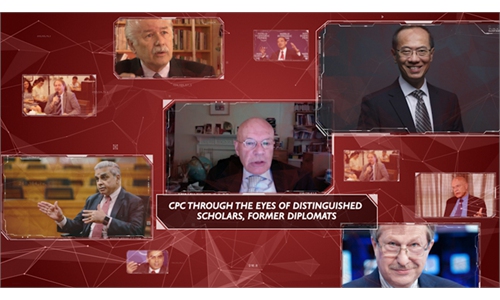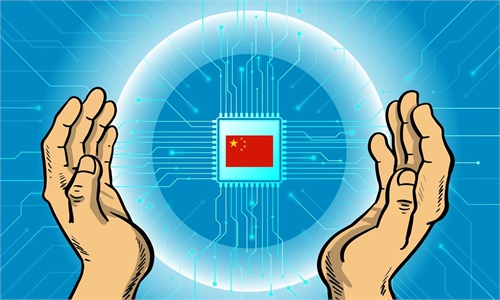
Firework at the Bird's Nest in Beijing on Monday Photo: Cui Meng/GT
As Chinese people across the country celebrate the remarkable achievements of the Communist Party of China (CPC) over the past century and look forward to another glorious century on Thursday, a sobering reminder of the Party's original mission has also become omnipresent amid a joyful festive atmosphere.
"Remaining true to our original aspiration and keeping our mission firmly in mind." That's a maxim hard to miss for lines of visitors at the site of the first National Congress of the CPC in Shanghai, the place where the Party started its journey in 1921 - or anywhere else around the country from every museum to historical site to every government and Party office building.
The maxim provides the answers to two questions: Why did Chinese people choose the CPC to lead their country in the first place? How can the CPC withstand the test of history and keep leading the country toward the great rejuvenation of the Chinese nation?
Xi Jinping, general secretary of the CPC Central Committee, said this maxim first in 2017 when he delivered the report of the 19th National Congress of the CPC. "The original aspiration and the mission of Chinese Communists is to seek happiness for the Chinese people and rejuvenation for the Chinese nation," he said.
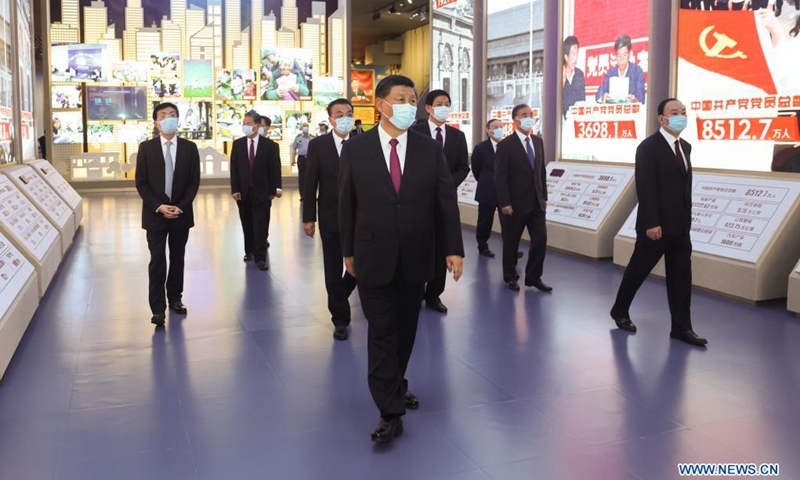
Xi Jinping and other Communist Party of China (CPC) and state leaders Li Keqiang, Li Zhanshu, Wang Yang, Wang Huning, Zhao Leji, Han Zheng and Wang Qishan visit an exhibition on CPC history themed "staying true to the founding mission" at the Museum of the CPC in Beijing, capital of China, June 18, 2021.Photo:Xinhua
Legitimacy from the people
The Western narrative about China or the CPC has always doubted the legitimacy of the Party to govern a country with 1.4 billion people because the Western liberal political idea believes China's political system does not have a Western standard of "democracy." It supposes the Chinese political system is unable to effectively respond to the demands of its people. Without a Western-style one-person-one-vote election and multiparty system, how can the CPC ensure its qualification to represent its people?
In fact, China did try almost every kind of Western political system long ago. In the era of the late Qing Dynasty (1644-1911), in order to save the poor and weak country from endless domestic chaos and humiliating failures against invasions launched by foreign imperialists and colonialists, Chinese political elites and revolutionary pioneers tried their best to find a path.
Many Western political ideas were introduced to China at that time, including liberalism, conservatism, anarchism and fascism, long before the October Revolution in 1917 which brought Marxism to China.
"Our ancestors tried everything they could find from the outside world," said Zhang Weiwei, director of the China Institute of Fudan University in Shanghai, noting that "from a constitutional monarchy to a multiparty system, from a parliamentary system to a presidential system, they tried them all, but unfortunately, none of these could effectively help China to protect itself and end the chaos."
More importantly, none of these choices could represent the vast majority of Chinese people.
Why did Marxism or socialism eventually become the final choice? When the CPC was established in July 1921, it had around 50 Party members represented by 13 deputies, and at the very beginning, it was not a widely accepted idea in China as it was too different from the traditional culture of the country and it was not localized. In other words, it had not yet been integrated with Chinese characteristics.
But the CPC had one unique advantage - it represents the interests of proletarians. And thanks to the creative exploration and innovations made by the first-generation CPC leadership with Mao Zedong at its core, the CPC included peasants in its leading force for China's revolution.
From the 1920s to the 40s, about 80-90 percent of the population in most regions of China were peasants. Uneven urbanization led to an enormous number of impoverished people in urban areas as well. Adding to the endless wars and famines, millions of people struggled for their lives every day.
Mao's innovative contribution in revolutionary theory was for the first time the CPC localized or "Sinicized" Marxism to serve the interests of the Chinese people, but this went against the orthodoxy of classic Marxist theory upheld by the Communist International and the Soviet Union - that the revolution should start from major cities and be led by the urban working class.
Eventually, Chinese Communists decided to support Mao’s leadership to innovate and Sinicize Marxism, and the CPC’s brave attempt eventually greatly empowered the Party. The vast majority of Chinese, who never had any political rights, finally had their own representatives.
The CPC was not just a party of poor people who were the same as peasant uprising forces in Chinese history, as its leaders were mostly intellectuals in China's most developed urban areas at that time including Shanghai and Peking, with overseas education backgrounds.
Jin Yinan, a professor at the PLA's National Defense University, said during a recent speech that "the CPC was receiving the most advanced thoughts in the most developed cities, and gathering the bravest warriors in the least developed villages."
The CPC used these advanced thoughts to arm its warriors from rural areas, making its army a modern force with unswerving faith to fight for the liberation of the Chinese people, rather than their own selfish interests like the peasant uprising forces in Chinese history.
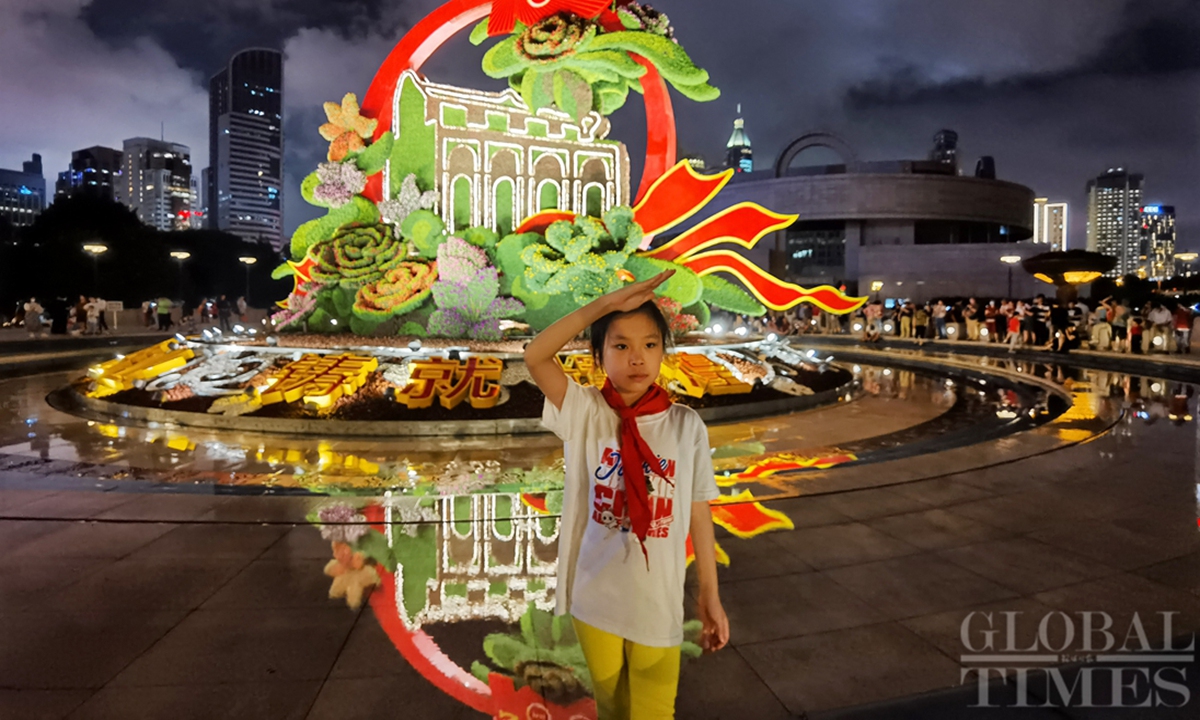
Photo: Yang Hui/GT
Capacity for self-renewal
Not only in the revolutionary era, but also in the era after reform and opening-up in 1978, the CPC's capability to self-correct and self-renew enables it to ensure a different destiny compared to communist parties in many Eastern European countries.
The CPC has once again successfully overcome the challenges, seized the opportunities of economic globalization, realized effective self-correction and activated the great potential of the Chinese nation to ensure the majority of the people enjoy the benefits of economic development.
So the CPC is a combination of different people from different classes who fight for the most fundamental interests of the Chinese nation, and this is why it is different from other political powers that had ruled China before 1949 and in nature only served the interests of bureaucrat capitalists, foreign imperialists, colonialists and feudalists to maintain their unfair and illegitimate rule over the Chinese people.
"To seek happiness for the Chinese people." This is the original aspiration of the Party and this is the power of the faith that supported numerous pioneers within the Party who died for their dream during the bloody revolutionary fight against foreign invaders as well as domestic enemies.
This has made the CPC a party that originated from the people and has symbiotic ties with the people. This is the nature of the CPC. Zhang said the CPC is completely different from Western political parties which only represent a part of the people or some specific classes, ethnic groups or communities within their countries, so they need multiple parties to struggle for power and keep their fragile "checks and balances." It will sometimes paralyze and polarize society, while the CPC is a party to represent the collective interests of all people in China.
Maybe China's performance in containing the COVID-19 epidemic is a good example to explain this. Why did the West, with the one-person-one-vote elected government with multiparty systems and so-called "free press" fail to protect their people? Why do many Western people refuse to cooperate with their elected governments but believe anti-intellectual conspiracy theories online?
Why did the CPC prioritize people's lives rather than economic growth at the very beginning? Why did China recover sooner than the rest of the world from the pandemic? Why do Chinese people trust their government and strictly follow scientific instructions and regulations? The answers have already been told in the history.
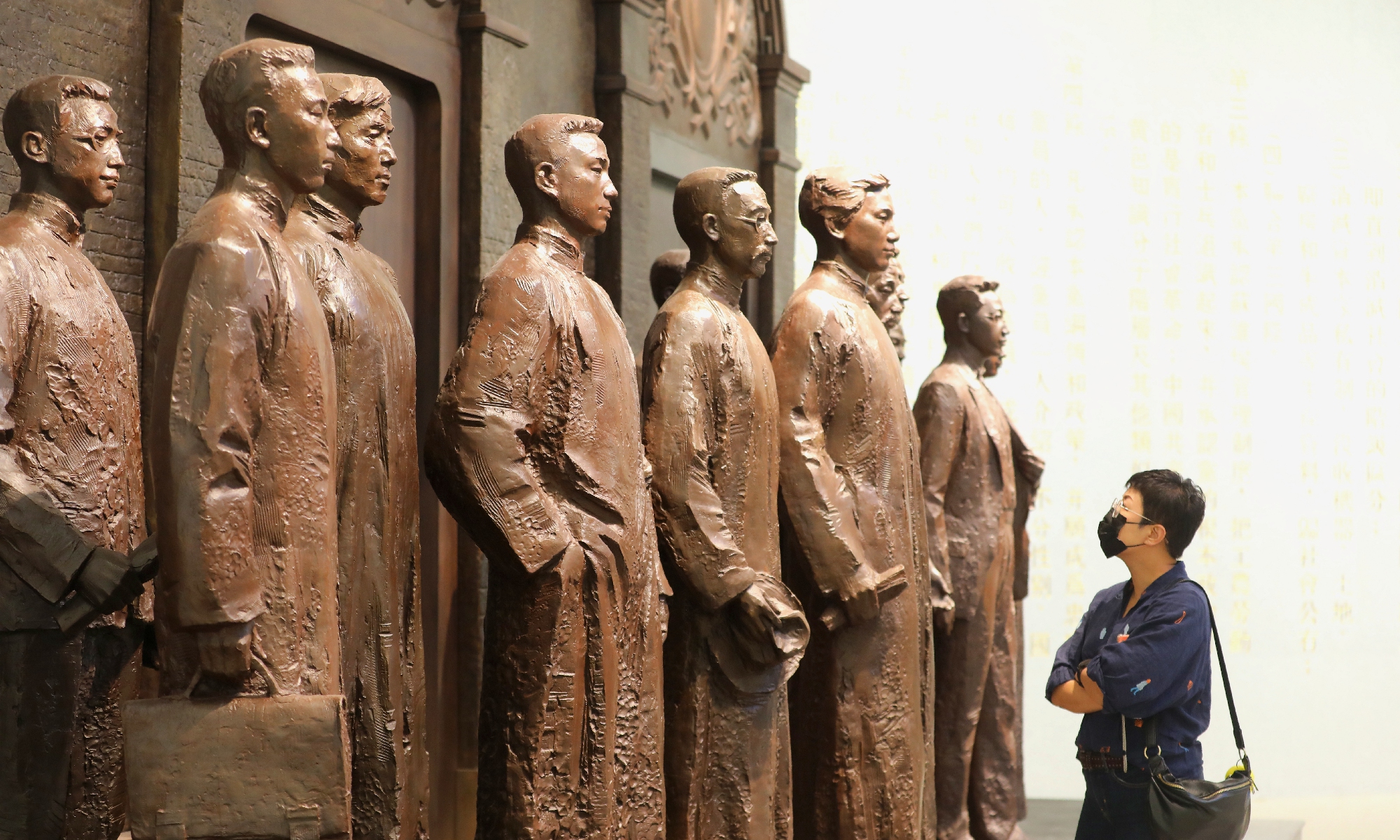
A visitor looks at statues of earlier generations of revolutionaries at the site of the First National Congress of the CPC in Shanghai on Thursday when restoration at the site finished and it is reopened to the public as a museum. Photo: Yang Hui/GT
Mission of the nation
The aspiration needs to be proven by accomplishing missions. Without successfully solving problems and delivering what the people need, the original aspiration was just a meaningless slogan.
Socialism was chosen by many countries after World War II, but why many communist parties in other countries were abandoned by their own people eventually? Because they failed to accurately identify the most significant missions in different historic stages, and blindly and stubbornly followed the classic rules in the books, or pursued unwise Westernization to abandon the correct theories which had guided their revolution in the past. The CPC did not make these mistakes or effectively corrected its mistakes to find the right direction.
From 1949-1979, the first 30 years of the People's Republic China (PRC), the Party solved "the risk of being invaded" by defeating the US and its allies in the Korean Peninsula and developing nuclear weapons. This was the first time since the late Qing Dynasty that China became a fully independent and autonomous state which was able to effectively reject bullying and humiliation from the West. It was able to protect its own territory and people from any invasion, even if it was launched by the most powerful country in the world.
From 1979 to the present, the CPC realized that the new mission is to solve "the problem of being starved." Deng Xiaoping, the core of the second-generation CPC leadership, bravely and confidently innovated China's socialist theory again in the 1970s and 80s without pushing an unwise thorough Westernization. This allowed the CPC to effectively lead China to embrace economic globalization and push forward modernization. Eventually, the CPC successfully carried out its reform and opening-up policies, which delivered an economic miracle for the Chinese nation and its people.
China, at present, under the leadership of the CPC, has become a country which is able to continually improve and modernize the livelihood for 1.4 billion people and help hundreds of millions of its population to get rid of poverty, protect its sovereignty against provocations and pressures from the only hegemonic super power in the world and effectively safeguard regional peace, build the biggest high-speed railway networks and most developed 5G service, and operate and construct a space station as well as conduct explorations on Mars.
Apart from developing its own country, the CPC has ambition and takes action to help many countries worldwide, especially developing countries which were not treated fairly in the Western-dominated globalization. They can share the benefits of China's development through the Belt and Road Initiative and fight global challenges like the COVID-19 pandemic and global warming together. In other words, under the leadership of the CPC, China is paying forward efforts to building a community with a shared future for mankind.
But 100 years ago, not many people had the confidence to optimistically predict that a poor, old and weak country which was humiliated by Western colonialists and described as the "Sick Man of East Asia" could become a great power with global influence, one that is able to win the competition with the West in many areas in just 100 years.
All these achievements that China gained under the leadership of the CPC have proven that the Party is qualified to find and accomplish its missions and keep its aspiration in mind, and now it is marching forward together with its people to the next and most fundamental mission - the great rejuvenation of the Chinese nation.
In the past 100 years, the Chinese nation has experienced so many disasters, so much pain and distress, but there is an old and popular saying in China that "Much distress regenerates a nation." After experiencing so much distress, the nation must be regenerated otherwise all the painful memories and sacrifices would be meaningless, so rejuvenation is the common and ultimate dream shared by the people of China.
The humiliating history 100 years ago taught Chinese over and again with bloody lessons that without unification, sovereignty and territorial integrity, China could lose everything and peaceful development would just be wishful thinking.
Even today, the US and some of its allies still want to take China's right of development away, but compared to 100 years ago, Western major powers today are the ones with anxiety, not China.
Many Western countries who have never experienced and refused to learn about China's history failed to understand how important national rejuvenation is for China, and why sovereignty, national unity and territorial integrity to Chinese people are unchallengeable "political correctness." If Western countries do not understand the significance of national rejuvenation to Chinese and refuse to respect China's dignity as a great nation, they will never learn the correct ways to deal with Chinese and coexist with China peacefully.
Regaining the status, dignity and glory that the Chinese nation lost 100 years ago is a key reason why the Chinese Communists started their revolutionary journey, and it is also the destination of their future journey. With unshakable support and trust from the Chinese people as always, the CPC must and will achieve this goal soon.

